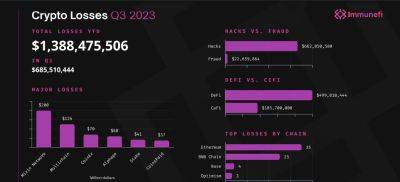$900 Million Has Been Stolen in Crypto Hacks This Year
Disclaimer: The Industry Talk section features insights by crypto industry players and is not a part of the editorial content of Cryptonews.com .
The total lost to crypto hacks in 2023 is on course to surpass $1 billion. By September 30, a total of $900M had been stolen by hackers, an astonishing figure even if it fails to match the $2.7B lost through similar attacks last year. While the cumulative value of crypto stolen in 2023 is lower, the number of hacks is greater.
The smaller average haul in 2023 can be partially attributed to falling asset prices and reduced DeFi TVL. With less dollars locked into protocols, there’s been less for hackers to steal. While hemorrhaging over $100M a month to hackers isn’t a good look for the industry, crypto users can at least take comfort from the fact that attackers are focusing their efforts on projects, not people. In the wake of the FTX collapse and other scandals that rocked crypto last year, there are signs that users are taking wallet security more seriously.
Public blockchains provide a permanent record of who did what, when, and how. This makes them ideal for forensically analyzing hacks, phishing attacks, and exploits. One thing they can rarely do, however, is provide proof of who the attacker was – even if the clues are there. Onchain analytics service Cielo has a public list of wallets involved with some of this year’s biggest hacks. It includes the hackers of Mixin ($200M), HTX ($8M), and CoinEx ($55M). Those were just a few of the hacks perpetrated in September, when a total of $308M was stolen.
DefiLlama, which tracks major crypto hacks, records such entry methods as database attack, frontend attack, and compromising private keys. Hackers are nothing if not industrious.
Read more on cryptonews.com






















